Trusted Advisor Customer Service Blog Posts
Written By Jeff Mowatt – (all original content not AI generated)
Written By Jeff Mowatt – (all original content not AI generated)
Do they love you in spite of or because of a foul-up?
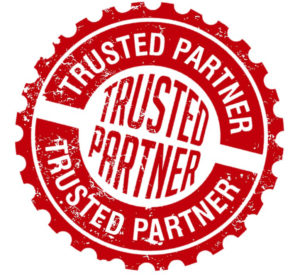 Let’s assume that generally your company does a good job of taking care of customers… it’s just that occasionally, stuff happens. The question becomes, when there’s a service failure that the company caused, what’s the fastest way to recover customer goodwill. My short answer - when companies bring me in to deliver seminars (live or virtually) - is fix the problem AND the relationship. That means that of course you’ll give them a replacement/ refund/ alternative, as any ethical organization would. However, fixing the problem doesn’t address the likely frustration, delay, inconvenience, and sometimes cash outlay that the foul-up caused for the customer. That’s why we need to also give the customer something for the hassle. That way, the customer discovers that unlike other organizations, you’ll go the extra mile when there’s a problem. In other words, they become more loyal not in spite of, but because of the service failure. It’s a significant step towards differentiating your brand and being considered by customers as their trusted partner.
Let’s assume that generally your company does a good job of taking care of customers… it’s just that occasionally, stuff happens. The question becomes, when there’s a service failure that the company caused, what’s the fastest way to recover customer goodwill. My short answer - when companies bring me in to deliver seminars (live or virtually) - is fix the problem AND the relationship. That means that of course you’ll give them a replacement/ refund/ alternative, as any ethical organization would. However, fixing the problem doesn’t address the likely frustration, delay, inconvenience, and sometimes cash outlay that the foul-up caused for the customer. That’s why we need to also give the customer something for the hassle. That way, the customer discovers that unlike other organizations, you’ll go the extra mile when there’s a problem. In other words, they become more loyal not in spite of, but because of the service failure. It’s a significant step towards differentiating your brand and being considered by customers as their trusted partner.
Service Failure? Hope you did this first…
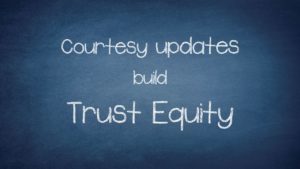 "Our team members need to nurture relationships with our stakeholders before there’s an incident.” This was a senior manager at a large industrial services company. I was preparing a seminar for his team and was asking which communication areas he’d like us to target. The company has a stellar safety record, part of which stems from how they communicate proactively with major stakeholders. He pointed out that if there’s ever an incident, they shouldn’t be asking who their contact is, or discovering there’s a new person that doesn’t know them. If that happens, they're suddenly put on the defensive and given no benefit of the doubt. I call this approach, building trust equity. It’s why courtesy reports and updates - even when they’re not required – are so valuable in maintaining loyalty, especially when things go wrong. How about you – are you proactively building trust equity with your customers?
"Our team members need to nurture relationships with our stakeholders before there’s an incident.” This was a senior manager at a large industrial services company. I was preparing a seminar for his team and was asking which communication areas he’d like us to target. The company has a stellar safety record, part of which stems from how they communicate proactively with major stakeholders. He pointed out that if there’s ever an incident, they shouldn’t be asking who their contact is, or discovering there’s a new person that doesn’t know them. If that happens, they're suddenly put on the defensive and given no benefit of the doubt. I call this approach, building trust equity. It’s why courtesy reports and updates - even when they’re not required – are so valuable in maintaining loyalty, especially when things go wrong. How about you – are you proactively building trust equity with your customers?
How to Eliminate Customer Conflicts – with Zero Effort
 Of all the books and tips about how to get along better with friends, family and customers, there’s one approach that I believe is the most effortless and under rated. I was reminded of it when our 17 year old daughter, Haley complained about Gail, her classmate, who apparently thrives on creating drama. Haley concluded, “I find I have to bite my tongue a lot around Gail.” “Good call,” I offered, “Remaining silent is often the smart move.”
Of all the books and tips about how to get along better with friends, family and customers, there’s one approach that I believe is the most effortless and under rated. I was reminded of it when our 17 year old daughter, Haley complained about Gail, her classmate, who apparently thrives on creating drama. Haley concluded, “I find I have to bite my tongue a lot around Gail.” “Good call,” I offered, “Remaining silent is often the smart move.”
Sooner or later in almost every relationship, people will say or do something that’s mildly annoying. While the natural response may be for us to take offense and lash out, the most powerful response is often to say and do absolutely nothing. By not responding in anger you build a reputation as someone who thinks before acting. Conflict, in order to exist, requires pushback. I’m not suggesting that we let people get away with being abusive. But it’s a reminder for all of us to choose our battles. As the expression goes, never miss a good opportunity to shut-up
I’d like your opinion…
 Imagine you’re a repeat customer of a company that’s launching a new product. Which of these two sales pitches is more likely to interest you:
Imagine you’re a repeat customer of a company that’s launching a new product. Which of these two sales pitches is more likely to interest you:
- We have an exciting new product we are about to release.
- We are about to release a new product and we’d like your opinion.
For most customers option ‘a’ sounds like an advertisement. Ads are easily tuned-out. Contrast that to option ‘b’ where the company is requesting your input. They leave it to you to determine whether it’s exciting. Since you’re asked to evaluate it, you begin to feel a sense of ownership. If you discover it is indeed that good, you’re more likely to not only buy it, but also recommend it. Quite a difference for just changing a few words. So next time you have a new product or service, consider approaching your customer with, “I’d like your opinion…”
Answer the client’s NEXT unspoken question
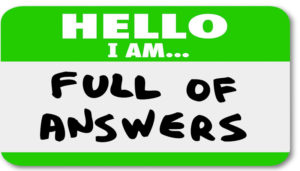 “The best advice I ever received on earning customer respect was…” (This was a manager I interviewed in preparation for a customized virtual Trusted Advisor seminar I would be staging for her company). She said a mentor advised her to, “… always answer the client’s NEXT unspoken question.” In other words, when you share information with a customer, it often prompts more questions like, what are the costs… what are the alternatives… how does this address my other concerns and goals... etc. The key is not forcing the client to ask obvious follow up questions. Give that information up front. My take on why this approach is so impactful is it demonstrates you are thinking ahead of the customer. It proves you’re considering their larger desires, and it positions you as a strategic thinker, not just an order taker. So, next time you report to a customer or other stakeholder, be sure to also answer their next unspoken question.
“The best advice I ever received on earning customer respect was…” (This was a manager I interviewed in preparation for a customized virtual Trusted Advisor seminar I would be staging for her company). She said a mentor advised her to, “… always answer the client’s NEXT unspoken question.” In other words, when you share information with a customer, it often prompts more questions like, what are the costs… what are the alternatives… how does this address my other concerns and goals... etc. The key is not forcing the client to ask obvious follow up questions. Give that information up front. My take on why this approach is so impactful is it demonstrates you are thinking ahead of the customer. It proves you’re considering their larger desires, and it positions you as a strategic thinker, not just an order taker. So, next time you report to a customer or other stakeholder, be sure to also answer their next unspoken question.
Are you an Informer or Interpreter?
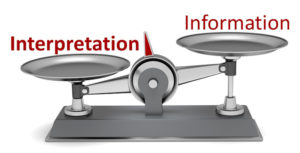 I believe those who claim we are living in the information age are missing the point. Your customers have more information and choices than they know what to do with. That’s the problem. Too much information. What customers are craving for – and willing to pay a premium for – is analysis. They want your interpretation of all the available products/services/solutions available, and they want your advice about which are best suited to their unique needs. They don’t want you to send them to websites, offer to send them more information, or hand them instruction manuals. Information has become a cheap commodity. It’s your interpretation and advice that makes your services highly valued.
I believe those who claim we are living in the information age are missing the point. Your customers have more information and choices than they know what to do with. That’s the problem. Too much information. What customers are craving for – and willing to pay a premium for – is analysis. They want your interpretation of all the available products/services/solutions available, and they want your advice about which are best suited to their unique needs. They don’t want you to send them to websites, offer to send them more information, or hand them instruction manuals. Information has become a cheap commodity. It’s your interpretation and advice that makes your services highly valued.
Thank you for Calling…
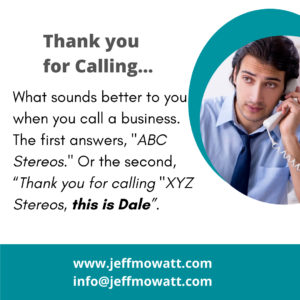 Quick – when phoning a company, which of these two organizations would you prefer doing business with? The first answers, “ABC Stereos.” The second answers, “Thank you for calling XYZ Stereos, this is Dale.” If you’re like most customers, the second company gets your business. They sound more professional and they sound like they have had training on answering the telephone. When employees are trained properly to answer the phone, there’s a good chance they’re also trained to solve your problems. Lesson: providing “telephone training” creates an easy competitive advantage over your competitors.
Quick – when phoning a company, which of these two organizations would you prefer doing business with? The first answers, “ABC Stereos.” The second answers, “Thank you for calling XYZ Stereos, this is Dale.” If you’re like most customers, the second company gets your business. They sound more professional and they sound like they have had training on answering the telephone. When employees are trained properly to answer the phone, there’s a good chance they’re also trained to solve your problems. Lesson: providing “telephone training” creates an easy competitive advantage over your competitors.
Eye on the Prize
 In a work-world that’s increasingly filled with interruptions and distractions, it’s easier for people to become more busy but less productive. The irony is that if you tend toward perfectionism you’re even more likely to be side-tracked. You know the routine: you’re focused on one task when the phone rings, someone walks-in, or an email arrives. so – in the interest of being responsive – you move to that. Then something else catches your eye. I’ve found in these situation when I’m spinning my wheels, it’s helpful to remind myself, “Eye on the Prize.” It’s a simple mantra to help you ignore the distractions, return to the task (the prize) and get it off your list. The bonus is at the end of the day you feel like you actually accomplished something.
In a work-world that’s increasingly filled with interruptions and distractions, it’s easier for people to become more busy but less productive. The irony is that if you tend toward perfectionism you’re even more likely to be side-tracked. You know the routine: you’re focused on one task when the phone rings, someone walks-in, or an email arrives. so – in the interest of being responsive – you move to that. Then something else catches your eye. I’ve found in these situation when I’m spinning my wheels, it’s helpful to remind myself, “Eye on the Prize.” It’s a simple mantra to help you ignore the distractions, return to the task (the prize) and get it off your list. The bonus is at the end of the day you feel like you actually accomplished something.
The Humility Advantage
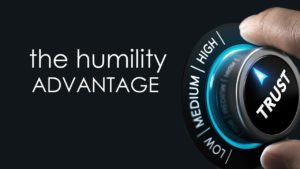 My ears perked up when I heard a politician who, during a radio interview, made a statement that included the phrasing, “I don’t profess to be knowledgeable in all areas of… What I DO know is…” I found myself thinking, Wow – he’s honest and smart. Ironic how admitting up front what you don’t know actually increases your credibility when you make a statement about what you do believe. The technique itself is easy. The challenge is being secure enough and humble enough to admit we don’t have all the answers.
My ears perked up when I heard a politician who, during a radio interview, made a statement that included the phrasing, “I don’t profess to be knowledgeable in all areas of… What I DO know is…” I found myself thinking, Wow – he’s honest and smart. Ironic how admitting up front what you don’t know actually increases your credibility when you make a statement about what you do believe. The technique itself is easy. The challenge is being secure enough and humble enough to admit we don’t have all the answers.
Creating Customer Buy-in
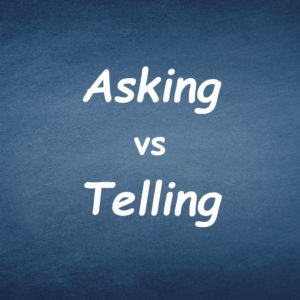 Imagine that after studying your customer’s problem, you’ve come up with an innovative solution. The challenge is the more we think of our solution as being brilliant, the more likely we are to oversell it. Next time you have an idea, product, service that’s out of the ordinary, ask: What if…? For example, “What if we had a way to…? Then wait for the customer to verbalize the possibilities. Further ask: “What would be the value of that?” Again the other person continues to sell themselves. Asking what if shifts the ownership of the idea to the customer. When that happens, you’ve literally created buy-in.
Imagine that after studying your customer’s problem, you’ve come up with an innovative solution. The challenge is the more we think of our solution as being brilliant, the more likely we are to oversell it. Next time you have an idea, product, service that’s out of the ordinary, ask: What if…? For example, “What if we had a way to…? Then wait for the customer to verbalize the possibilities. Further ask: “What would be the value of that?” Again the other person continues to sell themselves. Asking what if shifts the ownership of the idea to the customer. When that happens, you’ve literally created buy-in.

